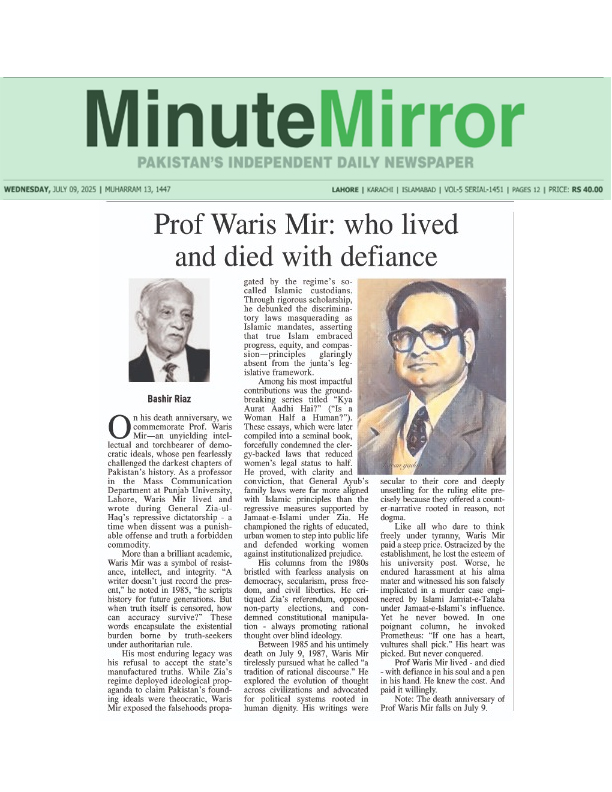Writer: Bashir Riaz
Date: 9th July 2025
On his death anniversary, we commemorate Prof. Waris Mir—an unyielding intellectual and torchbearer of democratic ideals, whose pen fearlessly challenged the darkest chapters of Pakistan’s history. As a professor in the Mass Communication Department at Punjab University, Lahore, Waris Mir lived and wrote during General Zia-ul-Haq’s repressive dictatorship – a time when dissent was a punishable offense and truth a forbidden commodity.
More than a brilliant academic, Waris Mir was a symbol of resistance, intellect, and integrity.
“A writer doesn’t just record the present,” he noted in 1985, “he scripts history for future generations. But when truth itself is censored, how can accuracy survive?” These words encapsulate the existential burden borne by truth-seekers under authoritarian rule.
His most enduring legacy was his refusal to accept the state’s manufactured truths. While Zia’s regime deployed ideological propaganda to claim Pakistan’s founding ideals were theocratic, Waris Mir exposed the falsehoods propagated by the regime’s so-called Islamic custodians. Through rigorous scholarship, he debunked the discriminatory laws masquerading as Islamic mandates, asserting that true Islam embraced progress, equity, and compassion—principles glaringly absent from the junta’s legislative framework.
Among his most impactful contributions was the groundbreaking series titled “Kya Aurat Aadhi Hai?” (“Is a Woman Half a Human?”). These essays, which were later compiled into a seminal book, forcefully condemned the clergy-backed laws that reduced women’s legal status to half. He proved, with clarity and conviction, that General Ayub’s family laws were far more aligned with Islamic principles than the regressive measures supported by Jamaat-e-Islami under Zia. He championed the rights of educated, urban women to step into public life and defended working women against institutionalized prejudice.
His columns from the 1980s bristled with fearless analysis on democracy, secularism, press freedom, and civil liberties. He critiqued Zia’s referendum, opposed non-party elections, and condemned constitutional manipulation – always promoting rational thought over blind ideology.
Between 1985 and his untimely death on July 9, 1987, Waris Mir tirelessly pursued what he called “a tradition of rational discourse.” He explored the evolution of thought across civilizations and advocated for political systems rooted in human dignity. His writings were secular to their core and deeply unsettling for the ruling elite precisely because they offered a counter-narrative rooted in reason, not dogma.
Like all who dare to think freely under tyranny, Waris Mir paid a steep price. Ostracized by the establishment, he lost the esteem of his university post. Worse, he endured harassment at his alma mater and witnessed his son falsely implicated in a murder case engineered by Islami Jamiat-e-Talaba under Jamaat-e-Islami’s influence. Yet he never bowed. In one poignant column, he invoked Prometheus: “If one has a heart, vultures shall pick.” His heart was picked. But never conquered.
Prof. Waris Mir lived – and died – with defiance in his soul and a pen in his hand. He knew the cost. And paid it willingly.
Note: The death anniversary of Prof Waris Mir falls on July 9.

